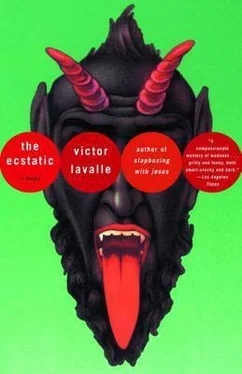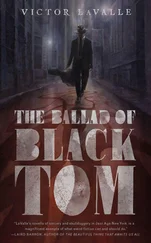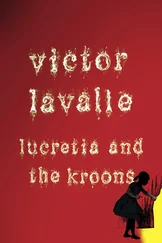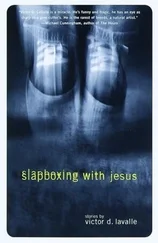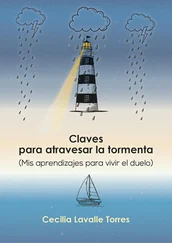— How come you get up there like Old Remus then? If you’re so proud of your ancestors?
— People can’t imagine a black aristocrat. They’ve invested too much into a past filled with only one narrative. Whites and blacks would believe I was a devil more easily. So I appear as the raggedy, noble cottonpluck. In Colorado I’ve been Uncle Iron, of the Southern Ute Indian tribe. I am the best businessman you ever saw. I promise you that.
Above the fireplace there were those six framed documents. One was a list of furniture either bought or sold in 1884. I did what everyone does, marveling that I could have bought a four-poster bed with the money in my pocket.
Among them was a framed newspaper clipping accounting a man’s purchase of one hundred acres of Frederick County land. I should restate that. One hundred acres more. (Otis Allen, free man, purchases plot, livestock.)
Along with the text was a sketch of the man; he was slim and bald as a monk. The eyes were far apart and his nose drifted to the left; I hoped the illustrator was just untalented.
Uncle Arms walked next to me with two glasses of that green elixir. The top of his head only came up to my sternum. He said, — The Quakers thought Otis would perish without their help, but he flourished.
I’ve read that some of the first English settlers in Jamestown resorted to a sort of cannibalism; so frantic from starvation they dug out fresh graves and ate the dead to survive. I collect those kinds of true stories. They were all just horrible.
— The Quakers said he’d perish, Uncle Arms repeated. But what’s become of them?
— If I had been a reporter what were you going to do?
— See if some of our girls were truly lying about their backgrounds.
— And then?
— If it could be proven I’d have to disqualify them. No luck.
— I need some air, I said. The wine with dinner, the emerald potion now, if we didn’t get outside I’d vomit toward his fireplace. We stood on the back steps of his home with breezes arranged around us.
I wanted to see the cabin, but Uncle Arms walked me past that.
It was empty anyway, or at least the door was closed. We walked through his field; sometimes he was next to me and other times ahead. It wasn’t long. Only ten minutes before we reached the stiff, sparse woods at the rear.
A faint dirt path waited. He was silent and so was I. It was darkest when we were in the middle of the trees. Still too far from the small field with pitched tents. There were leaves and brown thistles underfoot. Even Uncle Arms made noise walking across them. This brief forest trapped the coldest air along its floor. My legs and my head were in different temperate zones; my knees were chilly, but my face started sweating. I was having fun.
When we stepped out into the smaller field I covered my eyes because the nylon tents reflected light back at me. Twenty-five small domes zipped shut. I had a vision of Ledric stumbling, sick, out of each one. Hands on his stomach, phlegm in his hair.
The protestor’s yellow bus wasn’t totally empty. A thin woman was taking down their banner.
— Did you pay them to come? I whispered.
— You can’t pay these kinds of people to act outraged, but they’ll do it for free if the cause is just.
— And what did you tell them?
— That girls are being exploited.
— Do you know a man named Ishkabibble?
The tents weren’t in rows or anything so when we walked through them it was a winding trail. I’d thought they were sleeping, but as Uncle Arms and I walked along I heard people talking inside.
As I moved through I brushed too hard against a tent I guess, it unzipped and a groggy twenty year old looked out to see. His beard was patchy, but already fuller than anything I could grow. Since I’d woken him, he climbed out to smoke.
Portable radios sat outside two different tents, unguarded; their owners must have trusted the elements.
Uncle Arms brought me to the woman folding the sign. She was older than I thought. Not nineteen, but thirty-nine. In jeans and a sweatshirt, but her feet were bare.
— Don’t your toes get cold? I asked her.
She laughed loudly. It surprised me because Uncle Arms and I had been speaking in the quietest tones. She shook hands with Uncle Arms then me.
— Where are Jerry and his cameras?
She pointed at the bus. — They said it was too chilly in the tents.
— That bus can’t be warm, I said.
— I don’t know why they said no. It’s toastier with two people in a tent than one on a vinyl seat.
— Jerry’s inside? Uncle Arms asked and when she nodded he went in.
That left us there. I kicked a tire just to do something.
There were actually a lot of cigarette butts on the ground. Not thrown about, but in a neat pile.
— Take off your shoes, she said.
— What for?
She put one foot in the air. It was long and slim, the toenails were a lively red.
— I thought you people wouldn’t wear makeup.
— Which people?
— You’re with the protestors, right?
— That doesn’t mean I’m dead! Take off your shoes and let me see your feet. Just put them in the dirt.
Uncle Arms stepped off the bus with two videotapes in his hand. He shook them in front of me. There was a diesel smell coming from beneath the truck.
— I’m going to take him back up to the house.
— This is your last chance, she said to me. It’ll feel good.
— I’d feel silly barefoot, I admitted. I’m wearing a suit, I said.
She sighed. — Just once you ought to find out how it feels to be free from all those clothes.
— I’ll consider that, I said.
Uncle Arms led me away, back through the trees and into his yard. Before we had walked five feet of his property, I asked, — Why are you doing all this?
Uncle Arms said, — Those students sleeping there are the descendants of conscientious objectors everywhere. Nowadays the enemy is this way of life that tells young girls they’re beautiful because of their bodies.
— But you’re running a modeling contest!
— My ladies win because of hardships. Fortitude is probably the only way teenagers can show character anymore.
— You’ll never know how it feels to suffer generations of shame, he said. I mean to have your parent’s mistakes continue on and affect you. I don’t like what my great-grandfather did, but I’m not giving the money back.
We weren’t far from the main house, but we were right next to the cabin. Even without lights it gave a ginger glow. The cabin was run through with an animate silence that reached out and cupped my ears. The shingled roof sunk low in the middle like it was being sucked down from the inside.
I still heard Uncle Arms, but from farther away. He said, — If I can try to make the lives of a few girls better now, that’s one way to balance out Otis Allen’s fortune.
I don’t want to say I was scared. I was thrilled.
If not for Uncle Arms my night would have consisted of television and hotel food. Right now Nabisase was probably back in her room, the preliminary night over, polishing the shoes she’d be wearing with a formal gown tomorrow. Muttering about the failures of Mom and me. Why would I rush to hear that? I’d have the rest of my life to get berated. Going to see my sister would have been the right thing to do, but tonight I felt like a little fun.
— I want to help you, I whispered.
— What?
— Uncle Arms, I want to be your friend.
When I was eating dinner in the house the cabin had looked quaint, but now it was much older. I thought it was a replica, the kind they sell in miniature at Home Depot, a pretty place to keep useful things like a lawnmower, rock salt.
— It’s handmade, Anthony. More than two hundred years ago.
Читать дальше
